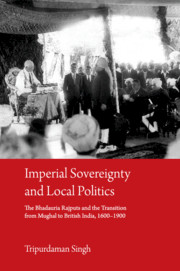 Imperial Sovereignty and Local Politics
Imperial Sovereignty and Local Politics Book contents
- Frontmatter
- Dedication
- Contents
- Acknowledgements
- List of Abbreviations
- Note on Transliterations
- Glossary of Commonly Used Indian Words
- Introduction
- 1 Integration into the Mughal System
- 2 Decline of the Mughals, Emergence of the Marathas
- 3 The Maratha Supremacy
- 4 The Rise of the Company Bahadur and the British Raj
- 5 The Uprising, the Bandit and Pax Britannica
- Conclusion
- Appendices
- Appendix I Timeline of Major Events
- Appendix II A Map of the Area, circa 1810s
- Appendix III A Map of the Area, circa 1830s
- Appendix IV A Map of the Area, circa 1870s
- Bibliography
- Index
Appendix I - Timeline of Major Events
from Appendices
Published online by Cambridge University Press: 26 April 2019
- Frontmatter
- Dedication
- Contents
- Acknowledgements
- List of Abbreviations
- Note on Transliterations
- Glossary of Commonly Used Indian Words
- Introduction
- 1 Integration into the Mughal System
- 2 Decline of the Mughals, Emergence of the Marathas
- 3 The Maratha Supremacy
- 4 The Rise of the Company Bahadur and the British Raj
- 5 The Uprising, the Bandit and Pax Britannica
- Conclusion
- Appendices
- Appendix I Timeline of Major Events
- Appendix II A Map of the Area, circa 1810s
- Appendix III A Map of the Area, circa 1830s
- Appendix IV A Map of the Area, circa 1870s
- Bibliography
- Index
Summary
1580 Bhadauria country invaded by Mughal troops led by Adham Khan (the emperor's foster brother). Bhadaurias submit to Mughal authority after being defeated in battle. Raja Mukutman is inducted as a Mughal mansabdar, and has his title and position recognised by the Mughal state.
1644 Maharaja Badan Singh commissions construction of the fort at Ater and the dam and temples at Bateshwar.
1654 Raja Badan Singh dies serving with the Mughal forces under Dara Shikoh in Kandahar.
1656 Raja Maha Singh appointed as faujdar or military commander of Fatehpur Sikri.
1658 Shah Jahan's illness triggers battle for succession. Raja Maha Singh allows Aurangzeb to ford the Chambal in Bhadawar, triggering the battle of Samugarh and Aurangzeb's eventual victory.
1680 Raja Udot Singh appointed as qiladar or castellan of Chittor during the Rajput rebellion.
1707 Emperor Aurangzeb, last of the Great Mughals, dies.
1710 Raja Gopal Singh appointed as faujdar or military commander of Dholpur and Bari.
1719 Emperor Muhammad Shah ascends the throne.
1720 Raja Gopal Singh granted the title of ‘Umara-I-Uzzam’, or the Grand Noble, and a mansab of 5,000 by the emperor.
1730 Raja Aniruddh Singh is appointed as the governor of Kanauj and given a mansab of 6,000 by the emperor.
1733 Maratha inroads into Bhadawar. Raja Aniruddh Singh is forced to pay off Maratha commanders in order to protect his dominions from pillage.
1737 Maratha army under Baji Rao I marches to Delhi and through the Bhadawar country, triggering the Maratha war. After a month-long series of battles, the Bhadaurias are thoroughly defeated and their country pillaged and forced to pay large war indemnities.
1748 On the buildup of arrears, the Peshwa's government divides the Bhadawar territory and takes over half the territory in lieu of unpaid debt.
1761 Raja Bakhat Singh and his troops join the Rajput side in the ill-fated Battle of Mangrol to try and take advantage of the Maratha defeat in the Third Battle of Panipat and destroy Maratha military power in the north.
1784 Daulat Rao Scindia confiscates most Bhadauria lands, leaving only 30 villages in the Bhadauria Raja's control.
- Type
- Chapter
- Information
- Imperial Sovereignty and Local PoliticsThe Bhadauria Rajputs and the Transition from Mughal to British India, 1600–1900, pp. 214 - 215Publisher: Cambridge University PressPrint publication year: 2019


